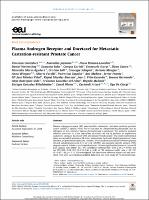| dc.contributor | Vall d'Hebron Barcelona Hospital Campus |
| dc.contributor.author | Conteduca, Vincenza |
| dc.contributor.author | Jayaram, Anuradha |
| dc.contributor.author | Romero-Laorden, Nuria |
| dc.contributor.author | Wetterskog, Daniel |
| dc.contributor.author | Salvi, Samanta |
| dc.contributor.author | Gurioli, Giorgia |
| dc.contributor.author | Morales Barrera, Rafael |
| dc.date.accessioned | 2021-03-18T08:46:10Z |
| dc.date.available | 2021-03-18T08:46:10Z |
| dc.date.issued | 2019-03 |
| dc.identifier.citation | Conteduca V, Jayaram A, Romero-Laorden N, Wetterskog D, Salvi S, Gurioli G, et al. Plasma Androgen Receptor and Docetaxel for Metastatic Castration-resistant Prostate Cancer. Eur Urol. 2019 Mar;75(3):368–73. |
| dc.identifier.issn | 0302-2838 |
| dc.identifier.uri | https://hdl.handle.net/11351/5769 |
| dc.description | Prostate cancer; Androgen receptor; Docetaxel |
| dc.description.abstract | Plasma androgen receptor (AR) gain identifies metastatic castration-resistant prostate cancer (mCRPC) patients with worse outcome on abiraterone/enzalutamide, but its relevance in the context of taxane chemotherapy is unknown. We aimed to evaluate whether docetaxel is active regardless of plasma AR and to perform an exploratory analysis to compare docetaxel with abiraterone/enzalutamide. This multi-institutional study was a pooled analysis of AR status, determined by droplet digital polymerase chain reaction, on pretreatment plasma samples. We evaluated associations between plasma AR and overall/progression-free survival (OS/PFS) and prostate-specific antigen (PSA) response rate in 163 docetaxel-treated patients. OS was significantly shorter in case of AR gain (hazard ratio [HR]=1.61, 95% confidence interval [CI]=1.08-2.39, p=0.018), but not PFS (HR=1.04, 95% CI 0.74-1.46, p=0.8) or PSA response (odds ratio=1.14, 95% CI=0.65-1.99, p=0.7). We investigated the interaction between plasma AR and treatment type after incorporating updated data from our prior study of 73 chemotherapy-naïve, abiraterone/enzalutamide-treated patients, with data from 115 first-line docetaxel patients. In an exploratory analysis of mCRPC patients receiving first-line therapies, a significant interaction was observed between plasma AR and docetaxel versus abiraterone/enzalutamide for OS (HR=0.16, 95% CI=0.06-0.46, p<0.001) and PFS (HR=0.31, 95% CI=0.12-0.80, p=0.02). Specifically, we reported a significant difference for OS favoring abiraterone/enzalutamide for AR-normal patients (HR=1.93, 95% CI=1.19-3.12, p=0.008) and a suggestion favoring docetaxel for AR-gained patients (HR=0.53, 95% CI=0.24-1.16, p=0.11). These data suggest that AR-normal patients should receive abiraterone/enzalutamide and AR-gained could benefit from docetaxel. This treatment selection merits prospective evaluation in a randomized trial. PATIENT SUMMARY: We investigated whether plasma androgen receptor (AR) predicted outcome in metastatic castration-resistant prostate cancer (mCRPC) patients treated with docetaxel, and we performed an exploratory analysis in patients treated with docetaxel or AR-directed drugs as first-line mCRPC therapy. We showed that plasma AR normal favored hormonal treatment, whilst plasma AR-gained patients may have had a longer response to docetaxel, suggesting that plasma AR status could be a useful treatment selection biomarker. |
| dc.language.iso | eng |
| dc.publisher | Elsevier |
| dc.relation.ispartofseries | European Urology;75(3) |
| dc.rights | Attribution 4.0 International |
| dc.rights.uri | http://creativecommons.org/licenses/by/4.0/ |
| dc.source | Scientia |
| dc.subject | Pròstata - Càncer |
| dc.subject | Metàstasi |
| dc.subject | Antiandrògens |
| dc.subject.mesh | Prostatic Neoplasms, Castration-Resistant |
| dc.subject.mesh | Androgen Receptor Antagonists |
| dc.subject.mesh | Docetaxel |
| dc.title | Plasma Androgen Receptor and Docetaxel for Metastatic Castration-resistant Prostate Cancer |
| dc.type | info:eu-repo/semantics/article |
| dc.identifier.doi | 10.1016/j.eururo.2018.09.049 |
| dc.subject.decs | neoplasias prostáticas resistentes a la castración |
| dc.subject.decs | antagonistas de andrógenos |
| dc.subject.decs | docetaxel |
| dc.relation.publishversion | https://www.europeanurology.com/article/S0302-2838(18)30739-5/fulltext |
| dc.type.version | info:eu-repo/semantics/publishedVersion |
| dc.audience | Professionals |
| dc.contributor.organismes | Institut Català de la Salut |
| dc.contributor.authoraffiliation | [Conteduca V] Istituto Scientifico Romagnolo per lo Studio e la Cura dei Tumori (IRST) IRCCS, Meldola, Italy. Centre for Evolution and Cancer, The Institute of Cancer Research, London, UK. [Jayaram A] Centre for Evolution and Cancer, The Institute of Cancer Research, London, UK. The Royal Marsden NHS Foundation Trust, London, UK. University College London Cancer Institute, London, UK. [Romero-Laorden N] Prostate Cancer Clinical Research Unit, Spanish National Cancer Research Centre, Madrid, Spain. Hospital Universitario La Princesa, Madrid, Spain. [Wetterskog D] Centre for Evolution and Cancer, The Institute of Cancer Research, London, UK. University College London Cancer Institute, London, UK. [Salvi S, Gurioli G] Istituto Scientifico Romagnolo per lo Studio e la Cura dei Tumori (IRST) IRCCS, Meldola, Italy. [Morales R] Vall d’Hebron Institute of Oncology (VHIO), Barcelona, Spain. Vall d’Hebron Hospital Universitari, Barcelona, Spain. Universitat Autònoma de Barcelona, Bellaterra, Spain |
| dc.identifier.pmid | 30773204 |
| dc.identifier.wos | 000458490100019 |
| dc.relation.projectid | info:eu-repo/grantAgreement/ES/PE2017-2020/PI16%2F01565 |
| dc.relation.projectid | info:eu-repo/grantAgreement/ES/PE2013-2016/PI15%2F01499 |
| dc.relation.projectid | info:eu-repo/grantAgreement/ES/PE2013-2016/PI15%2F676 |
| dc.rights.accessrights | info:eu-repo/semantics/openAccess |

